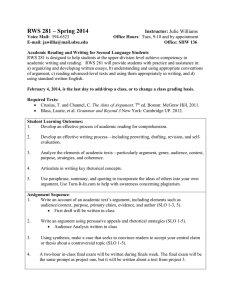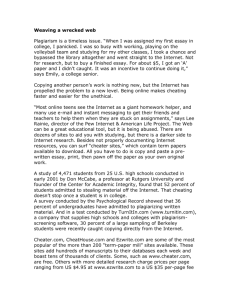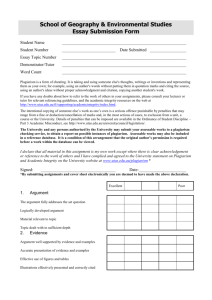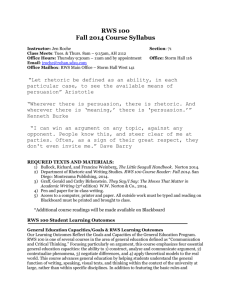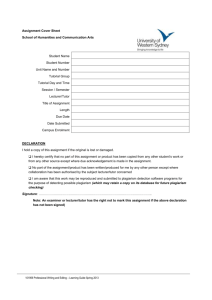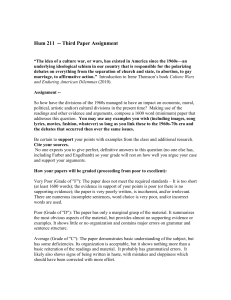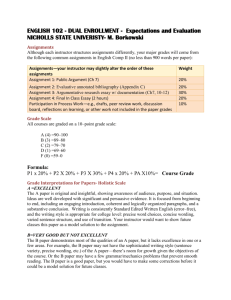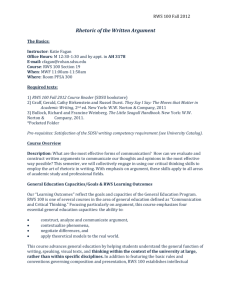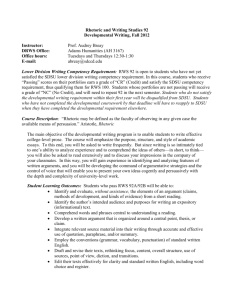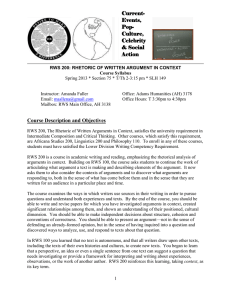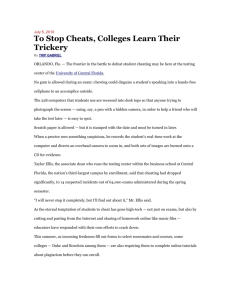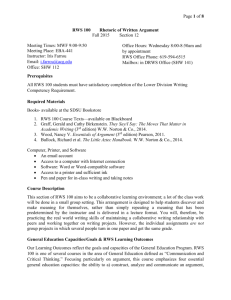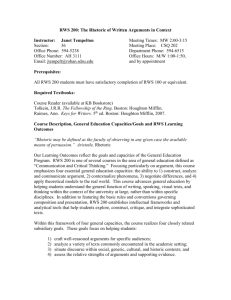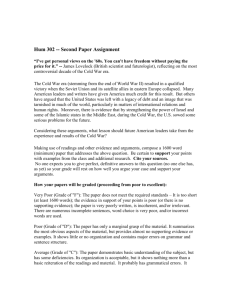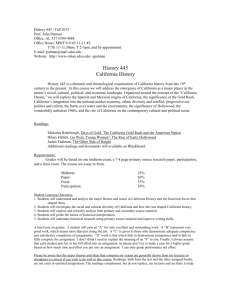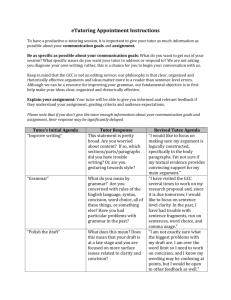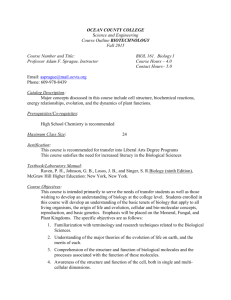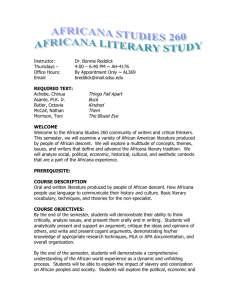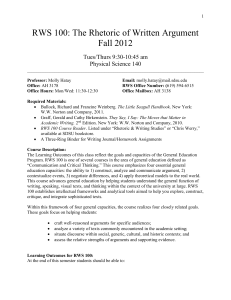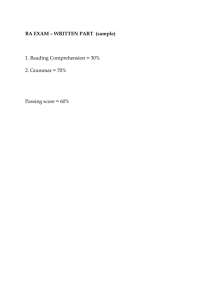RWS 281 – Fall 2012 Instructor: Julie Williams
advertisement
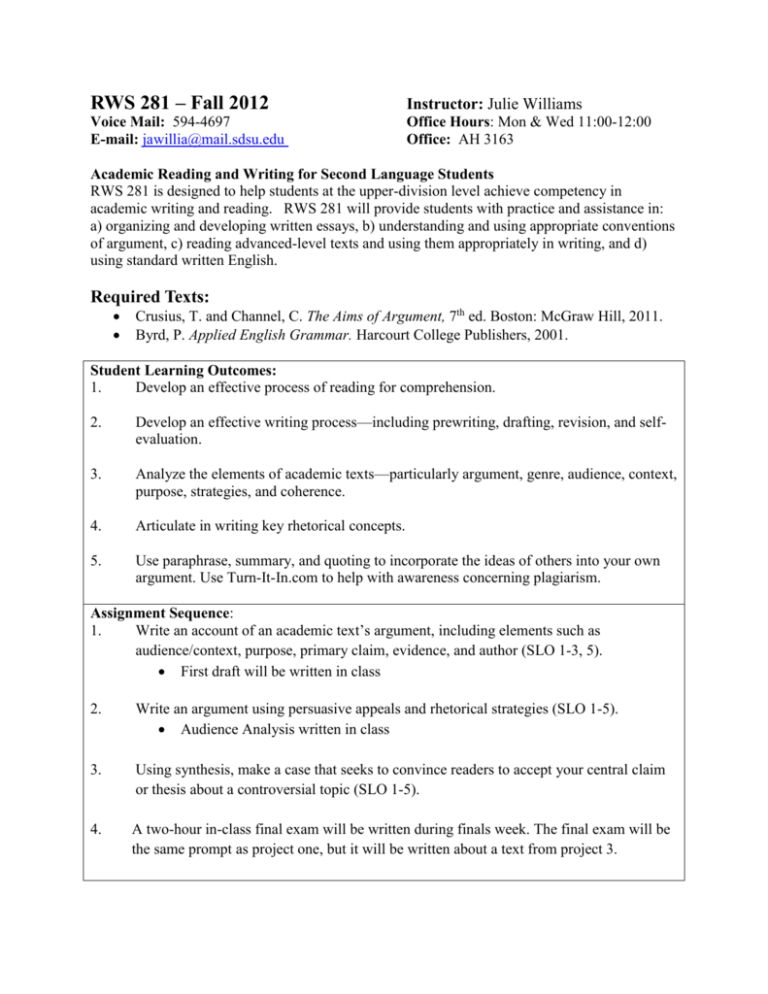
RWS 281 – Fall 2012 Instructor: Julie Williams Voice Mail: 594-4697 E-mail: jawillia@mail.sdsu.edu Office Hours: Mon & Wed 11:00-12:00 Office: AH 3163 Academic Reading and Writing for Second Language Students RWS 281 is designed to help students at the upper-division level achieve competency in academic writing and reading. RWS 281 will provide students with practice and assistance in: a) organizing and developing written essays, b) understanding and using appropriate conventions of argument, c) reading advanced-level texts and using them appropriately in writing, and d) using standard written English. Required Texts: Crusius, T. and Channel, C. The Aims of Argument, 7th ed. Boston: McGraw Hill, 2011. Byrd, P. Applied English Grammar. Harcourt College Publishers, 2001. Student Learning Outcomes: 1. Develop an effective process of reading for comprehension. 2. Develop an effective writing process—including prewriting, drafting, revision, and selfevaluation. 3. Analyze the elements of academic texts—particularly argument, genre, audience, context, purpose, strategies, and coherence. 4. Articulate in writing key rhetorical concepts. 5. Use paraphrase, summary, and quoting to incorporate the ideas of others into your own argument. Use Turn-It-In.com to help with awareness concerning plagiarism. Assignment Sequence: 1. Write an account of an academic text’s argument, including elements such as audience/context, purpose, primary claim, evidence, and author (SLO 1-3, 5). First draft will be written in class 2. Write an argument using persuasive appeals and rhetorical strategies (SLO 1-5). Audience Analysis written in class 3. Using synthesis, make a case that seeks to convince readers to accept your central claim or thesis about a controversial topic (SLO 1-5). 4. A two-hour in-class final exam will be written during finals week. The final exam will be the same prompt as project one, but it will be written about a text from project 3. Course Requirements Blackboard Grade Book: You will have increased control over your final course grade if you keep track of your earned points on Blackboard Grade Book. The points you earn during the semester will be posted about every two weeks. Attendance: More than three hours of absence will hurt your grade and, depending upon the points you have earned from other course work, may cause you to fail the class. Texting and off topic conversations during class may result in loss of attendance time. For every absence after the third one, a point will be deducted from “In class presence” grade, and you may lose “Class participation/homework” points. Individual tutoring sessions: Students will meet with the tutor three times, once each third of the semester: 1.) 9/1-25, 2.) 9/26-11/1, 3.) 11/2-12/5. These meetings may be 1) before an assignment is due; 2) prior to revising a paper; 3) prior to turning in written work; 4) for help with reading comprehension, writing development, organization, grammar and mechanics. You will be asked to write a short reflection about the tutor visit. Grammar Logs: Grammar Logs will be assigned as homework after papers one and two. In order to get credit for this work, you may be required to visit the tutor for instruction on specific grammar features. Assignments: Total points = 1000 Project #1 (125 points) Project #2 (125 points) Project #3 (150 points) Final Exam (200 points) Tutor Visits ( 30 points) In class presence (100 points) Class participation//homework (270 points) To fulfill the writing competency requirement, you must score 73% (730 points) or higher. Participation: This is not a lecture-style class. You are expected to participate actively in all class activities and discussions. This is especially true for certain writing assignments that require extensive group work. Coming to every class prepared and on-time will enhance your “Class participation” grade and help you to earn a higher overall grade in the class. Cell phones and other electronic equipment must be put away during class. Use of electronic equipment in class will be noted as absence. Assignments must be typed. Late work: All work must be turned in during the first 5 minutes of class. Late work will not be accepted after the first five minutes of class on the due date unless you have made arrangements with me, either in person or by email. You are allowed one late assignment during the semester; however, you must notify me before the assignment is due. Plagiarism: Cheating (which includes plagiarism) comprises a grave offense. Cheating will not be tolerated, and evidence of cheating by a student will result in loss of credit for the relevant assignment. As required by the SDSU Senate, evidence of cheating will be reported to the Center for Student Rights and Responsibilities. They will contact you for a meeting and they will keep a record of the offense. Evidence of cheating includes sharing homework as well as incorrectly using the Internet or other source. Turnitin.com: By taking this course, you agree that all required papers may be subject to submission for textual similarity review to Turnitin for the detection of plagiarism. Some papers submitted for review will be included as source documents in the global Turnitin repository to be used in future reviews. You should remove your name and any other personally identifying information from your papers prior to submission to Turnitin. First Day Homework: In a hand-written essay, tell me a little about yourself by answering the questions below. I want you to discuss your experience in learning more than one language and learning to read and write academic English. You do not need to answer ALL the questions; instead, use them to help you think about what to write. Furthermore, you do not need to answer them in this order. When you finish, give your essay a title. What kind of elementary school did you attend? Did you study in your first language or English? What kind of reading and writing did you do then? Did you like it? Why or why not? When did you first begin going to school in English (or learning English in school)? What were the classes like? What kinds of things do you read and write in your first language? In English? What kind of reading and writing do you like best? Over the years, as you’ve learned English, what kinds of instruction or classes have helped you the most? What kinds have helped you the least? What do you wish you had more help with? What kinds of English writing did you do in high school? How did your teacher(s) respond to it? Describe your ability to read and write in English. What do you find easier? What would you like help with?
